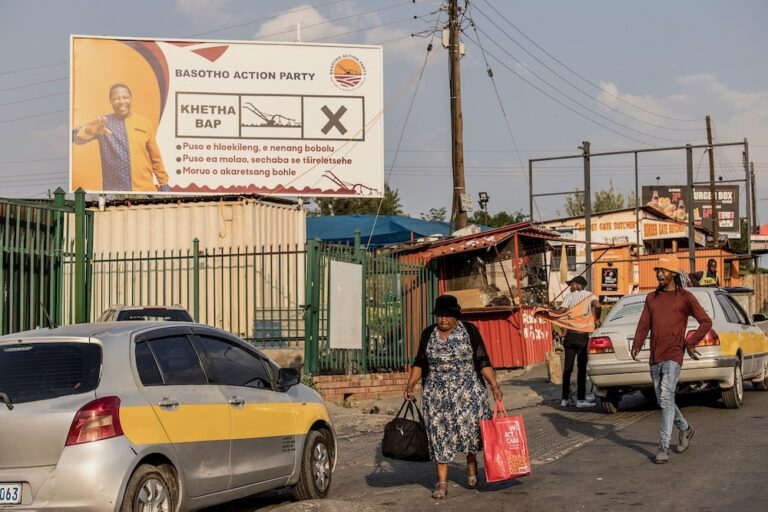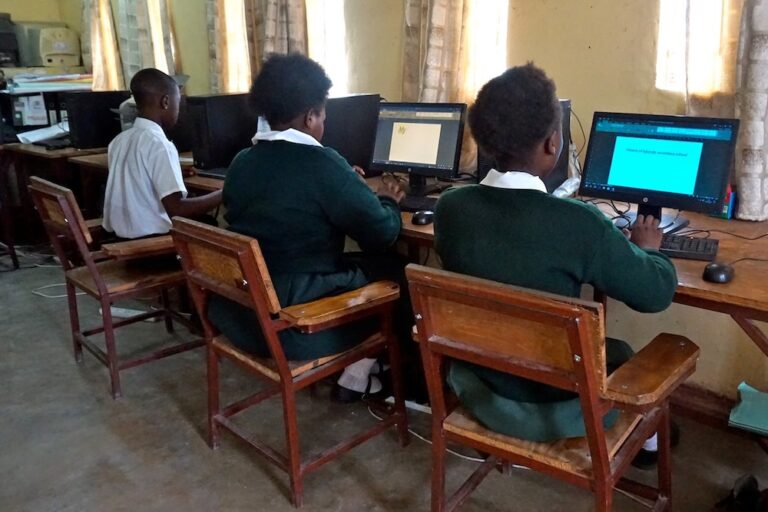(IPI/IFEX) – The following is an IPI press release: Press Statement 26 November 1999 (for immediate release) IPI Mission to Zambia sees many threats to media freedom An IPI delegation despatched to Lusaka, Zambia (November 23-25) identified several issues which need to be urgently addressed if freedom of expression and freedom of the press are […]
(IPI/IFEX) – The following is an IPI press release:
Press Statement
26 November 1999 (for immediate release)
IPI Mission to Zambia sees many threats to media freedom
An IPI delegation despatched to Lusaka, Zambia (November 23-25) identified
several issues which need to be urgently addressed if freedom of expression
and freedom of the press are to be truly respected in Zambia.
The members of the delegation – Wangethi Mwangi, Group Managing Editor of
The Nation in Kenya, and Peter Goff, Advisor with the International Press
Institute – held discussions with several members of the private and
state-run media, leaders of media organisations, and several governmental
representatives, including the Minister of Foreign Affairs and the Minister
of Information and Broadcasting Services.
The gravity of the situation was graphically illustrated by two separate
events that were on-going during the visit. The first involved a reporter
for the independent Monitor newspaper, Alphonsius Hamachila, who was
reportedly badly beaten by cadres of the ruling Movement for Multi-Party
Democracy (MMD) in Mazabuka last week after he wrote a lead story which
linked the MMD candidate in a parliamentary by-election to corrupt
practices. IPI called for a thorough investigation into the incident and
urged the government to bring the culprits to justice and to ensure that a
climate exists in Zambia where journalists do not feel threatened for
carrying out their profession.
The second point of pressing concern was the trial of the 12 journalists
from The Post newspaper which opened in the High Court on November 25.
(Judge Elisabeth Muyovwe adjourned the trial until December 22 following a
request from the prosecution on the grounds that the prosecution witnesses
were not available to attend the court. One of the 12 journalists, who had
been in South Africa when the article was published, was discharged on a
nolle prosequi.) The journalists are charged with espionage following a lead
article in the March 9 edition of the paper which questioned the military
capacity of Zambia to withstand an Angolan invasion. Speaking today in
Lusaka, Wangethi Mwangi of The Nation said: “While it would be inappropriate
to discuss the details of this case while the trial is underway, we can draw
attention to some internationally-accepted principles relating to freedom of
expression. A journalist can clearly not be charged with espionage if the
information they published was already in the public domain. Furthermore, no
person should be punished on national security grounds for disclosing
information if it cannot be established that the disclosure is likely to
harm a legitimate national security interest, or if the public interest in
knowing the information outweighs the harm from disclosure.”
Many aspects of Zambian law relating to the media impede free expression.
The delegates welcomed the comments made by Minister Newstead Zimba,
Minister of Information and Broadcasting Services, when he committed himself
to removing Zambia’s outdated media laws. In particular, the delegates
commended the work being carried out by the Media Law Reform Steering
Committee, a part of the government’s Good Governance programme which has
set out to identify repressive and inappropriate media laws. H. M. Chisuta,
a government representative on the steering committee, encouraged the
delegates by indicating that the Chiluba administration was keen to lead the
Southern African region in terms of progressive media legislation. IPI
Advisor, Peter Goff, said: “Progress is certainly being made and we applaud
the members of the steering committee for their work. However, we share the
concern of many members of the independent media who fear that, as before,
solid recommendations may be blocked or diluted at ministerial or
parliamentary level. The legislation needs a radical overhaul. Laws such as
the Official Secrets Act, the Emergency Powers Act and the Public Order Act
must be repealed as they obviously don’t belong in a democratic society.
There is a long list of laws which should be amended or repealed. In
particular, the Penal Code needs to be extensively amended and articles such
as those which provide for criminal libel or specifically protect the
reputation of the President or foreign dignitaries should be revoked. The
civil laws of defamation provide adequate protection for any person who
feels wrongfully harmed by the media.”
The delegates also called for Constitutional reform to adequately protect
freedom of expression and, specifically, freedom of the press. Legitimate
restrictions must be clearly and narrowly defined, and necessary in a
democratic society, as laid out in international covenants and case law,
they said. “The Constitution should also recognise the right of journalists
to protect their confidential sources of information, and should guarantee
the right of the public to access to official information. For purposes of
clarity, a Freedom of Information law should be enacted,” said Mwangi. “The
law should designate specific and narrow categories indicating where it is
necessary to withhold information in the public interest; and an accessible
and independent appeal process should be open to anyone who is denied access
to any public information.”
Referring to the state-owned media, Goff said that, “during the meetings,
they were often described as ‘government mouthpieces’ or ‘puppets’ by people
outside the executive. To allay these criticisms and to facilitate the
transition from state-owned to public service facilities, we urge the
government to privatise the state-owned newspapers and to establish a truly
independent broadcasting authority which would, in a transparent manner,
govern these institutions in the public interest and free from political
concerns.”
The Minister of Foreign Affairs, Keli Walubita, elaborated on the
government’s desire to ensure that the principles of free expression were
respected in Zambia. He was, however, critical of elements of the private
media which he thought were irresponsible and sensationalist. Minister
Walubita commented on the need for a Media Council to which, he felt, all
journalists should be answerable. The IPI delegates stressed that bodies
regulating and monitoring media content must be voluntary, self-regulating
mechanisms. Any other structure is open to abuse and would not be trusted by
large sections of the media, they said. As a non-partisan organisation
dedicated to furthering freedom of the press and to improving the global
standards of journalism, IPI offered to negotiate with all media
organisations operating in Zambia to see if a consensus could be reached on
maximising the effectiveness of self-regulating mechanisms. Minister
Walubita welcomed the initiative on the government’s behalf.


